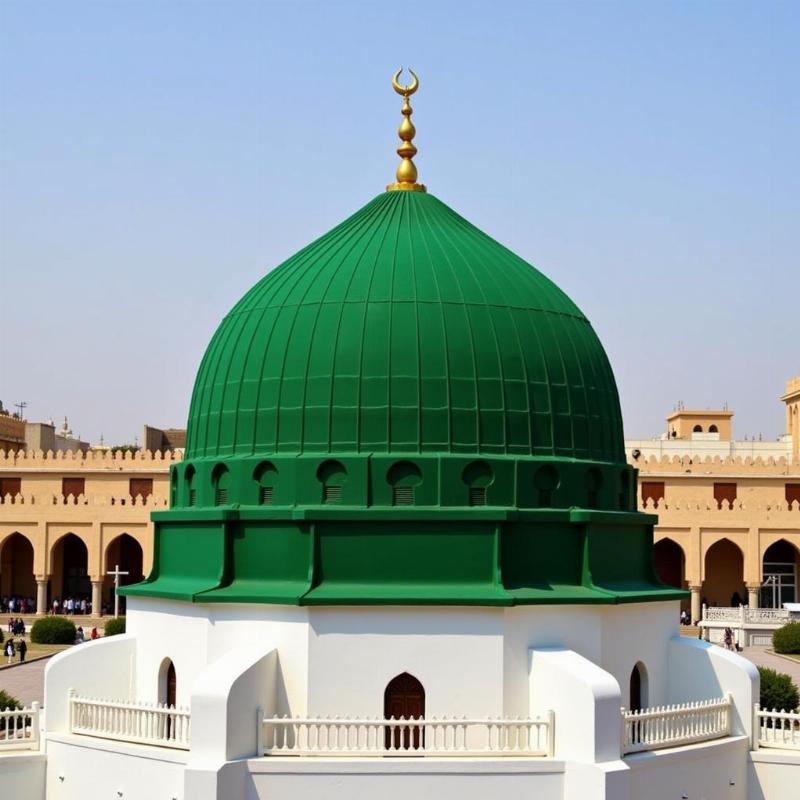Embark on a spiritual odyssey to the holy places of Islam, sites of profound religious significance and architectural marvels. These sacred destinations draw millions of pilgrims annually, offering a glimpse into the heart of Islamic faith and history. From the majestic Kaaba in Mecca to the Prophet’s Mosque in Medina, each location holds a unique place in the narrative of Islam. This journey is more than just a pilgrimage; it’s a transformative experience, connecting you to a rich tapestry of culture, history, and spirituality.
Exploring Mecca: The Heart of Islam
Mecca, the birthplace of Prophet Muhammad, is the holiest city in Islam. The focal point is the Kaaba, a cube-shaped structure draped in black cloth, towards which Muslims around the world turn to pray five times a day. Circumambulating the Kaaba, known as Tawaf, is a central ritual of the Hajj pilgrimage.
The Significance of the Hajj
The Hajj, one of the five pillars of Islam, is a mandatory pilgrimage for those physically and financially able. It takes place during the Islamic month of Dhu al-Hijjah and involves a series of rituals designed to cleanse the soul and strengthen faith.
Experiencing the Spirituality of Mecca
Beyond the Hajj, visiting Mecca offers a profound spiritual experience. The city resonates with a unique energy, a palpable sense of devotion that permeates every corner.
Medina: The City of the Prophet
Medina, the second holiest city in Islam, welcomed Prophet Muhammad after his migration from Mecca. Here, he established the first Muslim community and laid the foundations of Islamic governance. The Prophet’s Mosque, containing his tomb, is a major pilgrimage site.
Visiting the Prophet’s Mosque
The Prophet’s Mosque, with its iconic green dome, is a place of immense serenity. Praying within its walls is considered a highly rewarding act of worship.
 Prophet's Mosque in Medina
Prophet's Mosque in Medina
Exploring Medina’s Historical Sites
Medina is rich in historical sites that offer insights into the early days of Islam. Visiting these sites allows you to connect with the Prophet’s life and the development of the Muslim community.
Jerusalem: A City of Three Faiths
Jerusalem holds a special place in Islam as the site of Prophet Muhammad’s Night Journey and Ascension to heaven. The Al-Aqsa Mosque, the third holiest site in Islam, is located on the Temple Mount.
The Dome of the Rock
The Dome of the Rock, a magnificent golden-domed shrine, is a symbol of Islamic architecture. While not a mosque itself, it stands near the Al-Aqsa Mosque and is a significant landmark.
The Significance of Jerusalem in Islam
Jerusalem’s historical and religious importance in Islam makes it a destination of great significance for Muslims worldwide. Visiting the holy sites here offers a deeper understanding of Islamic history and faith.
Conclusion: A Pilgrimage of a Lifetime
Visiting the holy places of Islam is a transformative experience, enriching one’s faith and understanding of Islamic history and culture. Whether performing the Hajj, visiting the Prophet’s Mosque, or exploring Jerusalem’s holy sites, these journeys offer a profound connection to the heart of Islam.
FAQ
-
What are the five pillars of Islam? The five pillars of Islam are the foundational practices of the Muslim faith: Shahada (declaration of faith), Salat (prayer), Zakat (charity), Sawm (fasting), and Hajj (pilgrimage).
-
What is the significance of the Kaaba? The Kaaba is the most sacred site in Islam, believed to be built by Abraham and Ishmael. Muslims face the Kaaba during prayer.
-
Why is Medina called the City of the Prophet? Medina is called the City of the Prophet because it is where Prophet Muhammad migrated and established the first Muslim community.
-
What is the significance of the Al-Aqsa Mosque? The Al-Aqsa Mosque is the third holiest site in Islam, believed to be the place where Prophet Muhammad ascended to heaven.
-
When is the Hajj pilgrimage performed? The Hajj pilgrimage takes place during the Islamic month of Dhu al-Hijjah.
-
What is the difference between Mecca and Medina? Mecca is the holiest city in Islam and the birthplace of Prophet Muhammad, while Medina is the second holiest city and where he established the first Muslim community.
-
Can non-Muslims visit the holy places of Islam? Non-Muslims are not allowed to enter Mecca and Medina. However, they can visit other holy sites in Jerusalem.
About PlaTovi: PlaTovi is your trusted travel partner for unforgettable journeys to incredible destinations, offering comprehensive travel solutions for domestic and international travel, specializing in curated tour packages, seamless hotel and resort bookings, efficient flight reservations, and bespoke event planning. We also provide visa assistance and convenient airport transfers, ensuring a smooth and memorable travel experience. Whether you seek spiritual journeys or cultural explorations, PlaTovi is committed to crafting personalized travel experiences that cater to your unique needs and aspirations. Contact us at [email protected] or call us at +91 22-2517-3581 to plan your next adventure.